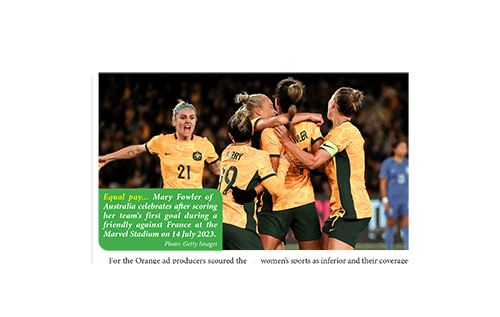With a few days to the start of the Women’s World Cup, teams are turning on the pressure on the sport’s governing body and spectators to give players equal pay and respect.
An advertisement by telecoms company Orange and the French national team that uses visual effects to draw attention to the quality of the women’s game, has gone viral on social media. On Monday, members of Australia’s national team released a video taking a swing at FIFA’s failure to grant women the same prize money as men.
Australia and New Zealand are co-hosting the tournament, which kicks off Thursday as New Zealand takes on Norway at Eden Park.
This year’s total prize pool for the women’s tournament was raised to US$150 million, but it’s still only about a third of the US$440 million handed to the winners of last year’s men’s World Cup in Qatar. The women say this is not enough. FIFA has said it is committed to closing the gap, and last month it announced a new payment model that it said provides every Women’s World Cup player “guaranteed remuneration for their achievements.”
But the Orange video is proving popular by making the point that, despite the pay disparity, women are just as skilled as men.
According to trade sites, Orange and French creative agency Marcel sought to overturn prejudices that “all too often surround the players — that the women’s game is less skilled and exciting than the men’s game.
“Many football ‘fans,’ without ever having watched women’s football, have strong opinions about the level of the players,” said trade journal Marketing Communication News.
For the Orange ad producers scoured the French Football Federation’s archives for weeks to find technical moves by the French Women’s National Team before searching for their “replicas” during the men’s game.
The videos are put together with dramatic music and screaming fans to give the impression of a male highlights reel.
At the end, it’s revealed that viewers have been watching members of the women’s team.
The assumption that women’s sports are inferior to men’s and, therefore, less deserving of investment and reward, has long been an issue perpetuated by misogynistic attitudes among some fans. In 2022, a survey of 1,950 male football fans in the United Kingdom by Durham University found that “openly misogynistic attitudes” still dominate football fandom. Those with misogynistic attitudes saw women’s sports as inferior and their coverage as “positive discrimination” or “PC nonsense,” author Stacey Pope wrote for the Conversation.
“Simply increasing the visibility of women is not enough to end sexism and misogyny in the sport,” she wrote. “What we need to reach equality and justice on the pitch and beyond is a gender revolution.”
In their video, the 23-member Australian Matildas squad list their predecessors challenges and achievements in securing better working conditions, but say the job’s not done yet. “Seven hundred and thirty-six footballers have the honour of representing their countries on the biggest stage this tournament. Yet many are still denied the basic right to organise and collectively bargain,” the players said in a video statement shared on Twitter.
“Collective bargaining has allowed us to ensure we navigate the same conditions as the Socceroos (the men’s team), with one exception. FIFA will still only offer women one quarter as much prize money as men for the same achievement,” the players added.
FIFA president Gianni Infantino says the governing body’s “ambition” is to offer equal prize money at the next World Cups in 2026 and 2027, but the Australian players want confirmation that it’s going to happen.
Last month, FIFA announced record prize money for the winning teams, along with payments for every athlete that takes part. Each player will receive at least US$30,000 for making the group stage, with members of the winning team taking home US$270,000 each.
FIFA says the payments will have a “meaningful impact” on the lives and careers of the players, while noting that the annual global salary of professional women footballers is around US$14,000.
“Beyond this, all member associations will also receive a record financial distribution based on their performance, which they can use to reinvest back into football in their countries and which we believe will help to propel the women’s game even further,” FIFA added. In May, Infantino bemoaned the low offers being made for media rights to the tournament, saying “broadcasters pay US$100 to US$200 million for the men’s FIFA World Cup, but they offer only US$1 to US$10 million for the FIFA Women’s World Cup.”
At the time, he said the offers were a “slap in the face for all the great FIFA Women’s World Cup players and indeed of all women worldwide.” The Matildas video pointed out how hard it is for players rising through the ranks to make a living.
“Our sisters in the elite women’s are still pushing for sport to be a full-time career so that they don’t have to work part-time jobs,” they said, calling on fans to support those players and the next generation of Matildas.
“We call on those who run the game to provide opportunities for girls and women in football, whether they be players, coaches, administrators, or officials,” they said.
“And we call on all those in positions of power across football, business, and politics to come on this journey with us to make women’s football as big as it can be here and around.”


